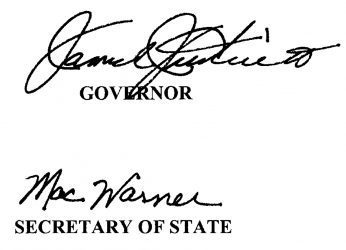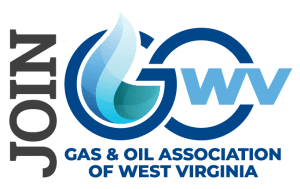STATE OF WEST VIRGINIA EXECUTIVE DEPARTMENT
At Charleston
EXECUTIVE ORDER NO. 32-20
By the Governor
WHEREAS, a State of Emergency was declared on the Sixteenth Day of March, Two Thousand Twenty for all counties in West Virginia (the “State of Emergency Declaration”), to allow agencies to coordinate and create necessary measures to prepare for and respond to the outbreak of respiratory disease caused by a novel coronavirus now known as COVID-19; and
WHEREAS, Chapter 15, Article 5, Section 6 of the Code of West Virginia authorizes the Governor to, among other things, control ingress and egress to and from a disaster area or an area where large-scale threat exists, the movement of persons within the area, and the occupancy of premises therein, and to perform and exercise other functions, powers, and duties that are necessary to promote and secure the safety and protection of the civilian population; and
WHEREAS, Executive Order 9-20 required all businesses and operations in West Virginia, except Essential Businesses and Operations as defined therein, to cease all activities within the state except for such minimum basic operations as are necessary to maintain the value of the business’s inventory, preserve the condition of the business’s physical plant and equipment, ensure security, process payroll and employee benefits, or related functions, and the minimum necessary activities to facilitate employees of the business being able to continue to work remotely from their residences, and provided exceptions for businesses such as home-based businesses and small businesses that do not invite in the general public and which have five or less employees in the office while requiring proper social distancing and hygiene practices be maintained at such businesses; and
WHEREAS, since the issuance of Executive Order 9-20 and other executive orders ordering closed or otherwise limiting occupancy of certain establishments and facilities in this state, implementation of successful public health measures has resulted in revised projections of rates of infection and COVID-19 related deaths in West Virginia, as well as ever-strengthening supply chains for personal protective equipment and other medical equipment and supplies, resulting in greater preparedness and response capacity throughout the state; and
WHEREAS, on April 16, 2020, President Trump issued his Guidelines for Opening Up America Again (the “Federal Guidelines”,)offering guidance to state and local leaders for a phased approach for reopening the economy, getting people back to work, and continuing to protect American lives; and
WHEREAS, on April 27, 2020, I, Governor Jim Justice, announced the state’ s re-opening plan, West Virginia Strong: The Comeback (the “Comeback Plan”), to phase in the re-opening of businesses in the state of West Virginia on a week by week basis to most effectively monitor and respond to the public health effects of this phased re-opening, which Comeback Plan was developed with consideration of the Federal Guidelines and plans and guidelines presented by the West Virginia Legislative leadership teams and the West Virginia Chamber of Commerce, among others, and in consultation with West Virginia’s public health experts; and
WHEREAS, the Comeback Plan includes certain metrics and conditions to safely re-open segments of West Virginia’s economy and get our citizens back to work, while ensuring the health and protection of all West Virginians, and especially the state’s significant elder and vulnerable population who are at most risk from the COVID-19 virus; and
WHEREAS, Executive Order 28-20 and Executive Order 30-20 allowed for the resumption of all medical procedures throughout the state while requiring that hospitals and ambulatory surgical centers around the state limit procedures to only more urgent procedures to ensure adequate response capacity and preserve necessary personal protective equipment and other resources at such facilities in the event of any surge of COVID-19; and
WHEREAS, re-opening additional segments of the state’s economy upon the achievement of the metrics announced in the Comeback Plan, utilizing a phased approach to re-open sectors of the economy week by week, while continuing to prioritize and provide for the health and protection of all West Virginians, and especially the state’s significant elder and vulnerable population, is in the public interest; and
WHEREAS, West Virginia’s public health experts have advised that lifting the stay-at home policy under Executive Order 9-20 and declaring herein a safer-at-home policy, allowing certain types of businesses to begin to re-open, allowing restaurants to resume outdoor dining, and partially lifting certain restrictions on gathering size in the coming week, all while ensuring certain precautions and procedures are in place for such businesses and continuing to strongly encourage elderly and vulnerable populations remain at home or their place of residence to the greatest extent possible, is appropriate at this time; and
NOW, THEREFORE, I, JIM JUSTICE, pursuant to the authority vested in me pursuant to the provisions of Chapter 15, Article 5, Section 6 and Chapter 15, Article 5, Section 1 of the Code of West Virginia, hereby DECLARE and ORDER, effective as of 12:01 AM, Eastern Standard Time, on the Fourth day of May, Two Thousand Twenty, unless rescinded, amended, or otherwise postponed by subsequent executive order prior to the effective date of this Order, as follows:
- The following provisions of Executive Order 9-20, generally known as the stay-at-home order, are hereby amended to now declare a general safer-at-home order, as follows:
- Section 1 is hereby deleted in its entirety and replaced with the following:
“l. It is safer at home or your place of residence, especially for elderly and vulnerable populations. To preserve public health and safety, and to ensure the healthcare system in West Virginia remains capable of serving all citizens in need, especially those at high risk and vulnerable to COVID- 19, all individuals within the State of West Virginia are under a general safer-at-home order and are strongly encouraged to stay at home or their place of residence unless performing an essential activity. An activity is essential if the purpose of the activity is one of the following:
- Obtaining food, medicine, and other similar goods necessary for the individual or a family member of the individual
- Obtaining medical care and treatment and other similar vital services for an individual or a family member of the individual
- Going to and from an individual’s workplace if such workplace and/or work is included in the definition of Essential Businesses and Operations as outlined in Section 3, below, or is exempt from the terms of this Order as a small business of IO or fewer employees with more limited customer interaction and customer contact, if any, under Section 2.
- Going to and from the home of a family member.
- Going to and from the home of another individual who, under the terms of a parenting plan or similar agreement, is entitled to visitation with or the care of a child.
- Going to and from an individual’s place of worship.
- Engaging in outdoor activity, provided that individuals at all times and as much as reasonably possible maintain social distancing of six feet from one another and abide by a 25-person limitation on gathering size.”
- Section 2 is hereby deleted in its entirety and replaced with the following:
“2 . Non-essential businesses and operations must generally continue to temporarily cease operations, but certain small businesses may resume operations with appropriate precautions. All businesses and operations in West Virginia, except Essential Businesses and Operations as defined below, shall continue to suspend all activities within the state except for such minimum basic operations as are necessary to maintain the value of the business’s inventory, preserve the condition of the business’s physical plant and equipment, ensure security, process payroll and employee benefits, or related functions, and the minimum necessary activities to facilitate employees of the business being able to continue to work remotely from their residences. Businesses such as home-based businesses may continue to operate, so long as any employees or contractors of such businesses perform activities from their own residences. Further, small businesses that have ten or less employees in their place of business and which have more limited customer interaction and customer contact, if any, including some retail businesses which historically have more limited customer traffic of approximately 50 customers or less per day (including, without limitation and by way of example only, furniture stores, flower shops, jewelry stores, smaller specialty sporting goods stores, smaller clothing stores, specialty uniform and equipment stores, and specialty shoe stores) may continue to operate, but must ensure that proper social distancing and hygiene practices are maintained, and must limit occupancy by the public, if any, to no more than two (2) individual members of the public per 1,000 square feet of interior space at any given time. Additional guidance for such small businesses, Guidelines for West Virginia Small Businesses, is available at govemor.wv.gov.”
- Section 3, subsection (c) is hereby deleted in its entirety and replaced with the following:
“c. Food, beverage, and agriculture. Food and beverage manufacturing, production, processing, and cultivation, including farming, livestock, seed and feed stores, fishing, baking, and other production agriculture, including cultivation, marketing, production, and distribution of animals and goods for consumption, and businesses that provide food, shelter, and other necessities of life for animals, including animal shelters, rescues, shelters, kennels, and adoption facilities. Restaurants and other facilities that prepare and serve food and/or drinks, but only for outdoor service and consumption on such property as the restaurant or other facility owns or has a right to occupy or use, in accordance with the applicable guidelines for restaurants, A Guide to Safely Opening our Restaurants Through Takeaway Service & Outdoor Dining, available at govemor.wv.gov, or for consumption off premises, through such means as take-away, delivery, or drive through/drive in. Schools and other entities that typically provide food services to students or members of the public may continue to do so under this Order on the condition that the food is provided to students or members of the public on a pick-up or take-away basis only. Schools and other entities that provide food services under this exemption shall not permit the food to be eaten at the site where it is provided, or at any other gathering site due to the virus’s propensity to physically impact surfaces and personal property.”
- Section 3, subsection (n) is hereby deleted in its entirety and replaced with the following:
“n. Religious entities. Religious facilities, entities, and groups and religious gatherings, including weddings and funerals; provided that such gatherings should still practice proper social distancing of six feet between persons to the greatest extent possible. Additional guidance for religious entities, Guidance for Religious Entities and Funeral Homes, is available at governor.wv.gov.”
- Section 3 is amended and supplemented by the addition of the following subsections:
“y. Barbers and Cosmetologists. Barber shops, nail salons, and hair salons may operate in accordance with guidance and best practices developed, published, and disseminated by the West Virginia Board of Barbers and Cosmetologists, including ensuring all staff and employees wear masks and requiring appointments for services to be scheduled in advance with adequate time in between appointments to properly clean and disinfect and for customers to wait in their vehicles or otherwise not enter the business until such staff or employee is ready to provide services to such customer.
- Dog Groomers. Dog groomers may operate, but must generally follow applicable guidelines for small businesses, Guidelines for West Virginia Small Businesses, available at governor.wv.gov.”
- Section 4 is hereby deleted in its entirety and replaced with the following:
” 4. Prohibited activities. All places of public amusement, whether indoors or outdoors, including but not limited to locations with amusement rides, carnivals, zoos, museums, arcades, fairs, pool halls, bingo halls, malls (except that stores in a mall that have a direct outdoor entrance and exit that provide essential services and products under the terms of this Order and stores in a mall that have a direct outdoor entrance and exit that constitute those small businesses of IO or fewer employees with more limited customer interaction and customer contact, if any, as described in Section 2 of this Order, may remain open), children’s play centers, playgrounds, bowling alleys, movie and other theaters, concert and music halls, adult entertainment venues, racetracks (except where racetracks offer spectator less horse races, beginning no sooner than May 14, 2020, which shall not allow any in-person spectators but which horse races may be simulcast, provided that such horse racing shall be conducted in accordance with guidance and best practices developed, published, and disseminated by the applicable track operators and horsemen’s associations, including ensuring all staff and employees maintain proper social distancing and hygiene practices), social clubs, and other similar businesses shall be closed.”
- Section 5 is hereby deleted in its entirety and replaced with the following:
“5. Avoid social gatherings. All public and private gatherings of any number of people occurring outside a single household or living unit are prohibited, except for the limited purposes permitted by this Order. Any gathering of more than 25 people is prohibited unless exempted by this Order. Nothing in this Order prohibits the gathering of members of a household or residence.”
- Executive Order 6-20 is hereby terminated and is of no further effect; provided that the barber shops, nail salons, and hair salons previously prohibited from operating under that executive order must operate in accordance with guidance and best practices developed, published, and disseminated by the West Virginia Board of Barbers and Cosmetologists, including ensuring all staff and employees wear masks and requiring appointments for services to be scheduled in advance with adequate time in between appointments to properly clean and disinfect and for customers to wait in their vehicles or otherwise not enter the business until such staff or employee is ready to provide services to such customer.
- Executive Order 2-20, as it relates to the closure of casinos, is hereby amended to provide that all casinos shall remain closed to the general public, but that racetracks at such casinos may begin holding spectator-less horse races, beginning no sooner than May 14, 2020, which shall not allow any in-person spectators but which horse races may be simulcast, provided that such horse racing shall be conducted in accordance with guidance and best practices developed, published, and disseminated by the applicable track operators and horsemen’s associations, including ensuring all staff and employees maintain proper social distancing and hygiene practices.
- Elderly and vulnerable populations, including those who are 65 or older or have pre-existing conditions, are strongly encouraged to remain at home or their place of residence to the greatest extent possible.
IN WITNESS WHEREOF, I have hereunto set my hand and caused the Great Seal of the State of West Virginia to be affixed.
DONE at the Capitol in the City of Charleston, State of West Virginia, this Thirtieth day of April, in the year of our Lord, Two Thousand Twenty in the One Hundred Fifty-seventh year of the State.



